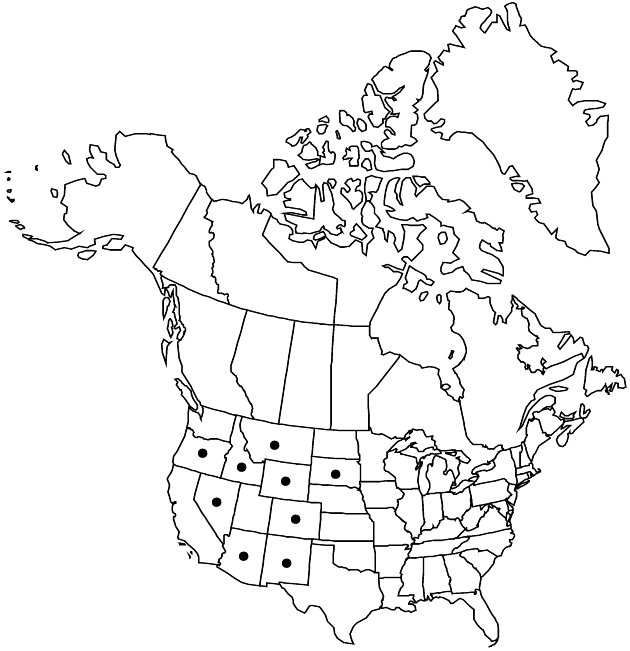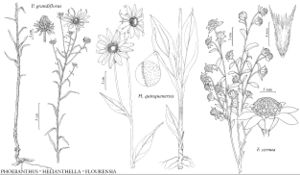Difference between revisions of "Helianthella quinquenervis"
Proc. Amer. Acad. Arts 19: 10. 1883.
FNA>Volume Importer |
imported>Volume Importer |
||
| (6 intermediate revisions by 2 users not shown) | |||
| Line 7: | Line 7: | ||
|year=1883 | |year=1883 | ||
}} | }} | ||
| − | |basionyms={{Treatment/ID/ | + | |basionyms={{Treatment/ID/Basionym |
|name=Helianthus quinquenervis | |name=Helianthus quinquenervis | ||
|authority=Hooker | |authority=Hooker | ||
| + | |rank=species | ||
| + | |publication_title=London J. Bot. | ||
| + | |publication_place=6: 247. 1847 | ||
}} | }} | ||
|synonyms= | |synonyms= | ||
| Line 26: | Line 29: | ||
|elevation=1400–3600 m | |elevation=1400–3600 m | ||
|distribution=Ariz.;Colo.;Idaho;Mont.;Nev.;N.Mex.;Oreg.;S.Dak.;Wyo.;Mexico (Chihuahua;Nuevo León). | |distribution=Ariz.;Colo.;Idaho;Mont.;Nev.;N.Mex.;Oreg.;S.Dak.;Wyo.;Mexico (Chihuahua;Nuevo León). | ||
| − | |discussion=<p>Helianthella quinquenervis grows primarily in the Rocky Mountains, Great Basin ranges, and Black Hills.</p> | + | |discussion=<p><i>Helianthella quinquenervis</i> grows primarily in the Rocky Mountains, Great Basin ranges, and Black Hills.</p> |
|tables= | |tables= | ||
|references= | |references= | ||
| Line 35: | Line 38: | ||
-->{{#Taxon: | -->{{#Taxon: | ||
name=Helianthella quinquenervis | name=Helianthella quinquenervis | ||
| − | |||
|authority=(Hooker) A. Gray | |authority=(Hooker) A. Gray | ||
|rank=species | |rank=species | ||
| Line 50: | Line 52: | ||
|publication year=1883 | |publication year=1883 | ||
|special status= | |special status= | ||
| − | |source xml=https:// | + | |source xml=https://bitbucket.org/aafc-mbb/fna-data-curation/src/2e0870ddd59836b60bcf96646a41e87ea5a5943a/coarse_grained_fna_xml/V19-20-21/V21_279.xml |
|tribe=Asteraceae tribe Heliantheae | |tribe=Asteraceae tribe Heliantheae | ||
|subtribe=Asteraceae (tribe Heliantheae) subtribe Ecliptinae | |subtribe=Asteraceae (tribe Heliantheae) subtribe Ecliptinae | ||
Latest revision as of 20:11, 5 November 2020
Plants (30–)50–150 cm. Cauline leaves: largest proximal to mid stems; blades usually 3– or 5–nerved, elliptic or ovate-lanceolate to lanceolate, 10–50 cm, faces sparsely hirsute or glabrous. Heads usually borne singly, ± nodding. Involucres hemispheric or broader, (25–)40–50 mm diam. Phyllaries (outer sometimes ± foliaceous) ovate to lanceolate (subequal to unequal, margins ciliate). Paleae scarious, relatively soft. Ray florets (13–)21; (corollas bright yellow) laminae 25–30(–40) mm. Disc corollas yellow. Cypselae strongly compressed, narrowly obovate (margins ciliate, faces strigose); pappi of 2 ± subulate scales plus 2–4+ shorter scales.
Phenology: Flowering Jun–Aug(–Oct).
Habitat: Moist meadows, aspen glades
Elevation: 1400–3600 m
Distribution

Ariz., Colo., Idaho, Mont., Nev., N.Mex., Oreg., S.Dak., Wyo., Mexico (Chihuahua, Nuevo León).
Discussion
Helianthella quinquenervis grows primarily in the Rocky Mountains, Great Basin ranges, and Black Hills.
Selected References
None.
